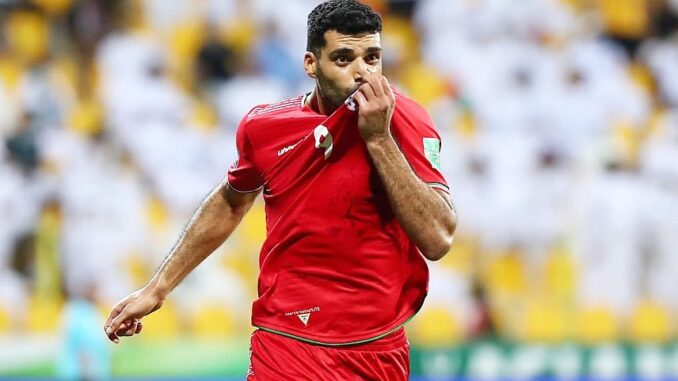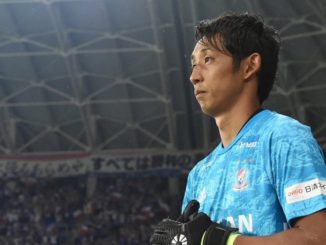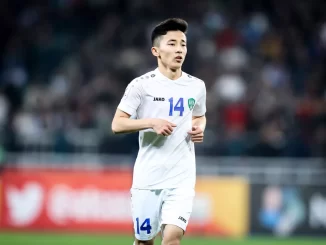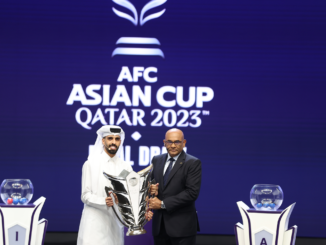
The opening game of the 2022 FIFA World Cup in Qatar is just over one year away – 376 days to be precise. Despite that, with the final round of Asian Qualifiers reaching its half way point this week, we are no closer to knowing which teams from Asia will qualify for world football’s global showpiece.
The road to Qatar 2022 has been long and gruelling, and this week shapes as a crucial one for many nations as teams jostle to cement their spot in the top two of both groups in order to secure that precious automatic qualification.
Iran is a nation for which nothing comes easy, and one that is never far away from its next drama.
During the Carlos Queiroz reign in particular, drama and dispute, usually between the Portuguese manager and the Iranian federation, was never far away. Under his successor, Dragan Skocic, things had been calm, relatively speaking, until now.
Mehdi Taremi is often the name on everyone’s lips in Iran, but now that is so for all the wrong reasons. The FC Porto star was sensationally left out of Iran’s latest squad after appearing to criticise Skocic in a tweet last month.
“I have to say that in addition to individual technique and fighting, Iranian players .… In terms of football knowledge and tactics, they have a very high understanding, but unfortunately, the problems are elsewhere. Long live Iran,” he wrote, in an apparent dig at Skocic after reports suggested the 53-year-old Croatian had criticised the tactical awareness of Iranian players.
The decision to drop Taremi, arguably Team Melli’s best and most important player with two goals and two assists in this final round already, has divided opinion. On one side is the view that Skocic had to draw a line in the sand and make it clear that dissent would not be tolerated.
On the other is the view that Skocic is out of his depth and should be immediately replaced.
Whatever your view of the situation, what isn’t in dispute is that Skocic has placed himself firmly in the hot seat ahead of their dual away clashes against Lebanon and Syria. With three wins and a draw from their opening four games, Iran are looking good to secure a top two spot and automatic qualification for what would be their third consecutive FIFA World Cup.
If he walks away with two wins, as would be expected for a team of Iran’s quality, his authority and position will only be enhanced. A message will have been sent loud and clear, and Taremi will have been reminded that Iran can survive without him.
Should Iran drop points, however, the heat will instantly be applied. He will have undermined his own position and authority; the critics will be out for blood.
While Iran find themselves in choppy waters, there are no such issues for Saudi Arabia.
The Green Falcons remain the last unbeaten side in the final round of qualifiers and travel to Sydney to take on an Australian side playing at home for the first time in 763 days.
This is by far the toughest challenge Herve Renard’s side will have faced in this entire qualifying campaign. While they have been one of the continent’s better performing sides, they have had the benefit of playing seven of their last eight matches at home, with the other match a hop, skip and a jump away in neighbouring Oman.
Form away from home, particularly on the eastern side of the continent, has been their Achilles heel for a long time.
At home, they haven’t been beaten since Australia inflicted a 3-1 defeat on them all the way back in 2011. In 19 qualifiers since, they’ve won 17 and drawn two. It is an imposing record. Away from home it is a different matter, however.
They scraped over the line against Uzbekistan in Tashkent in November 2019, with two goals in the final five minutes, while there were draws with Palestine and Yemen before that in this qualifying campaign.
When we go back to the previous campaign for Russia 2018, they lost three of their five away games in the final round against Japan, Australia and UAE.
They are Falcons at home and sparrows away.
Thursday night’s match against Australia, and next week’s against Vietnam in Hanoi, therefore, loom as a massive test. There has been definite improvement since Herve Renard took over, with a fresh new generation of talent emerging under the experienced Frenchman.
In this final round it has been the likes of Sami Al-Najei, Firas al-Buraikan and Saleh Al-Shehri who have stepped up and taken on the responsibility of finding the back of the net.
But if the Green Falcons want to become one of Asia’s most feared sides, they have to produce performances and results worthy of that on the road.
The former Morocco and Ivory Coast manager will be forced to change his central defensive pairing of Abdulelah Al-Amri and Abdullah Madu for the first time in this final round, with the latter withdrawing due to injury, as did experienced left back Yasser Al-Shahrani.
They are changes Renard could have done without, but in Ali Al-Bulaihi and Saud Abdulhamid, they have replacements ready to step into the void.
Change is also what Graham Arnold will be forced into with Tom Rogic, Aaron Mooy and Adam Taggart all missing from the Socceroos squad.
After their most recent game, a 2-1 loss to Japan at a quarter-filled Saitama Stadium, Arnold implored the respective Governments in Australia to loosen their COVID restrictions to allow the green and gold to play at home, where they have an almost impeccable qualifying record.
And, much to his delight, they have, with Australia playing their first home game in more than two years in front of what should be a near capacity crowd at CommBank Stadium in Sydney’s west.
While Arnold’s Socceroos have impressed away from home over the past two years, there is nothing like home comforts; the benefit of playing in front of your own fans and family cannot be quantified.
After a loss to Japan in their last encounter in October, Australia cannot afford to drop another three points here, lest they allow Japan back into the fight for one of those top two spots.
Speaking of the Samurai Blue, there is distinctly less pressure on Hajime Moriyasu after their last-start win over Australia, although it is never far away should they slip up.
The former Sanfrecce Hiroshima manager, who was under pressure to keep his job last month, looks to have kept the wolves at bay ahead of double away fixtures against Vietnam and Oman.
While no match can be considered easy at this stage of qualifying, especially given their loss to Oman in Osaka to open the campaign, they are matches that under normal circumstances would see Japan confident of securing at least four points, if not all six.
The win against Australia got their campaign back on track, this week could see it kick into gear.
Elsewhere, it’s a big week for Dutch managers Bert van Marwijk and Dick Advocaat, whose UAE and Iraq sides respectively have disappointed so far.
Advocaat, like Skocic in Iran, has been dealing with internal conflicts that resulted in the international retirement of Justin Meram and the sacking/resignation (depending on which story you believe) of long-time team manager Basil Gorgis, a figure who deeply divided opinion among fans, players and pundits.
Van Marwijk, in his second stint in charge of the UAE, faces a tough week with a trip to Korea followed by a trek right back across the continent to take on an improved Lebanon. While performances dramatically improved at the end of the second-round mid-year, that hasn’t transferred across into the final round.
A mixture of poor finishing and bad luck has conspired against the Whites this time around, but the time for excuses is over. Not just for the UAE, but for all teams. With Qatar 2022 getting closer by the day, this week more than any, is time for action and results.
Photo: IG/mehditaremiofficial9




